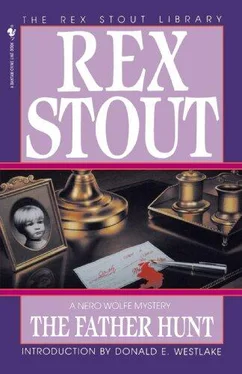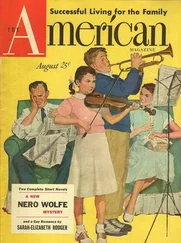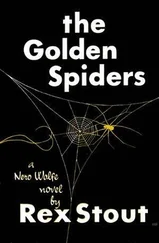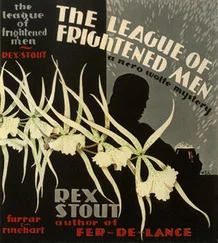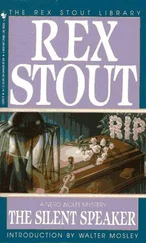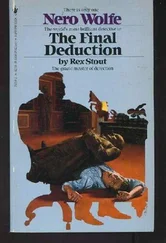Rex Stout - The Father Hunt
Здесь есть возможность читать онлайн «Rex Stout - The Father Hunt» весь текст электронной книги совершенно бесплатно (целиком полную версию без сокращений). В некоторых случаях можно слушать аудио, скачать через торрент в формате fb2 и присутствует краткое содержание. Жанр: Старинная литература, en-GB. Описание произведения, (предисловие) а так же отзывы посетителей доступны на портале библиотеки ЛибКат.
- Название:The Father Hunt
- Автор:
- Жанр:
- Год:неизвестен
- ISBN:нет данных
- Рейтинг книги:4 / 5. Голосов: 1
-
Избранное:Добавить в избранное
- Отзывы:
-
Ваша оценка:
- 80
- 1
- 2
- 3
- 4
- 5
The Father Hunt: краткое содержание, описание и аннотация
Предлагаем к чтению аннотацию, описание, краткое содержание или предисловие (зависит от того, что написал сам автор книги «The Father Hunt»). Если вы не нашли необходимую информацию о книге — напишите в комментариях, мы постараемся отыскать её.
The Father Hunt — читать онлайн бесплатно полную книгу (весь текст) целиком
Ниже представлен текст книги, разбитый по страницам. Система сохранения места последней прочитанной страницы, позволяет с удобством читать онлайн бесплатно книгу «The Father Hunt», без необходимости каждый раз заново искать на чём Вы остановились. Поставьте закладку, и сможете в любой момент перейти на страницу, на которой закончили чтение.
Интервал:
Закладка:
"Nero Wolfe's office, Archie Goodwin speaking."
Female voice: "Good morning. Mr. Jarrett would like to speak to Mr. Wolfe."
"Good morning. Please put Mr. Jarrett on."
"Is Mr. Wolfe there?"
"Yes."
"Please put him on."
"Now listen." I motioned to Wolfe. "Last Friday I got Mr. McCray for Mr. Wolfe and I was forced to put Mr. Wolfe on first You can't have it coming and going. Put Mr. Jarrett on or I hang up."
"May I have your name, please?"
"Archie Goodwin."
"Please hold the wire, Mr. Goodwin."
I timed it: two minutes and twenty seconds. Wolfe bad his phone.
"Eugene Jarrett speaking. Nero Wolfe?"
Me: "Please hold the wire, Mr. Jarrett."
Wolfe should have waited at least a minute, but he hates the phone, either holding or talking. "This is Nero Wolfe. Yes, Mr. Jarrett?"
"I have your letter. I'll come around six."
"Good. As I said in the letter, I'll appreciate it. I'll expect you."
They hung up together. There was a case where the approach took five minutes and the meet about ten seconds. A piece by a scientist in the Sunday New York Times Magazine which I had read during the weekend had explained why this is the age of instant communication.
There were some items in the morning mail that needed attention, or at least got it, but we were interrupted a few times by phone calls: from Saul, who had drawn nothing but blanks; from Fred, who had found three people who had recognized the photographs but hadn't been any help; and from Orrie, from Washington, who had verified most of Jarrett's places and dates and was working on the rest. The hospital part, which covered most of July, was airtight. You are probably thinking that the client was getting damned little for her money, and I agree. When I returned from a trip to 1the mailbox at the corner it was lunchtime, and as we crossed to the dining room Wolfe said something about Mr. Cramer and I asked if he had phoned. Wolfe said no, he had come, late Saturday afternoon.
I was sorry I had missed it because talk by those two is always worth hearing. You get good examples of how much a man can say in a few words and also of how little he can say in a lot of words. So back in the office after lunch I said I would just as soon know what Cramer had wanted, and Wolfe said only what he always wanted, information; he had said nothing that would help us any.
I settled back and crossed my legs. "I haven't kept count," I said, "but at least a thousand times I have given you a verbatim report of a conversation. I can't tell you
to because I don't pay you, you pay me, but I can suggest it. I am suggesting it."
A corner of his mouth went up a sixteenth of an inch. For him it was a broad smile. "My memory is as good as yours, Archie."
"Then it would be no strain. I said verbatim."
"I know you did." He squinted at me. "Well… Mr. Cramer, admitted by Fritz, arrived shortly after six o'clock. We ex-"
"The exact time?"
"I don't have it on my wrist, as you do. We exchanged greetings and he sat."
"Cramer: 'Where's Goodwin?'
"Wolfe: 'Not here, as you see.'
"Cramer: 'Yeah. I doubt if there's a man on earth as good at fielding questions as you are. So I'll ask another one. Saturday the nineteenth, a week ago, Goodwin rang Sergeant Stebbins and asked him about a hit-and-run three months ago that killed a woman named Elinor Denovo. Some crap about you and him discussing crime. Last Monday morning, I came and asked Goodwin why he had called Stebbins. He said he knew nothing about that hit-and-run except what he had read in the papers, and neither did you, and you hadn't been consulted about it, and your only client was a girl who wanted to find her father. I want the name of that girl. I wish Goodwin was here. Where is he?'
"Wolfe: 'Absent. Mr. Cramer. You may query me in that tone only when your questions are justified by your official function.'
"Cramer: 'Okay, I'll ask one that is justified. If you haven't been consulted about that hit-and-run why do you offer to pay five hundred dollars for information about Elinor Denovo? That also justifies my question about the girl-and about Goodwin. He told me a goddam lie.'
"Wolfe: 'No. I can repeat now what he told you a week ago, and I do, and it is true. I-' "
He broke off and demanded, "How the devil did he know that advertisement was mine?"
I turned my palms up. "Someone on some newspaper did a favor for some cop. If I find out who, you can write a letter to the publisher."
"Pah. To resume:
"Wolfe: '… and it is true. I am not investigating that hit-and-run. My client's concern with Elinor Denovo relates not to her death but to her life. You should have inferred that from the advertisement; it asks for information, not about her last day or even her last year, but about many years ago. The information-'
"Cramer: 'Who is Carlotta Vaughn?'
"Wolfe: 'You're not in good form, Mr. Cramer. The advertisement makes it obvious that Carlotta Vaughn is, or was, Elinor Denovo. The information my client has given me is confidential and has no bearing on the hit-and-run.'
"Cramer: 'You don't know that. When I'm investigating a homicide / decide what has a bearing and what hasn't.'
"Wolfe: 'Must we repeat ourselves? Must I remind you again that until events answer that question conclusively my judgment, for which I alone am responsible, need not bow to yours-nor yours to mine? Am I withholding information from an officer of the law? Yes. Is it pertinent to his investigation of a crime? No. You have never made me change that no to a yes. Do that and you'll have me.'
"Cramer: 'By God, I will. Some day I will.' "
Wolfe waved a hand toward the hall, waving Cramer out. "Next time I'll turn the recorder on. Questions."
I uncrossed my legs and straightened up. "No questions, just two comments. First, I think you left out a word or two, particularly one that he often uses. That's censorship, which you condemn. Second, there's something about that hit-and-run that makes it special, and it would be nice to know what it is. Cramer wouldn't be bothering personally about a three-month-old hit-and-run, even with you interested in the victim, unless it had some- special kink. Maybe a hot lead that fizzled out-anyway, something. But as you said, it's her life we're working on, not her death. Thank you for the report. Satisfactory."
He pushed a button, two short and one long, for beer.
I spent most of the next three hours finding out next to nothing about Eugene Jarrett. He wasn't in Who's Who, and since there was no other likely source of information about him in the office I went for a walk, keeping on the
sfiady side of the street. There were just four items about him in the Gazette morgue, and the only two worth an entry in my notebook were that he had married a girl named Adele Baldwin on November 18, 1951, and he had become a vice-president of Seaboard Bank and Trust Company in December 1959. Lon Cohen knew absolutely nothing about him, and neither did a couple of others on the Gazette that he got on the phone. On the way out I stopped at the sixteenth floor to see if there were any more replies to the ad and got two that were more of the same.
Читать дальшеИнтервал:
Закладка:
Похожие книги на «The Father Hunt»
Представляем Вашему вниманию похожие книги на «The Father Hunt» списком для выбора. Мы отобрали схожую по названию и смыслу литературу в надежде предоставить читателям больше вариантов отыскать новые, интересные, ещё непрочитанные произведения.
Обсуждение, отзывы о книге «The Father Hunt» и просто собственные мнения читателей. Оставьте ваши комментарии, напишите, что Вы думаете о произведении, его смысле или главных героях. Укажите что конкретно понравилось, а что нет, и почему Вы так считаете.
